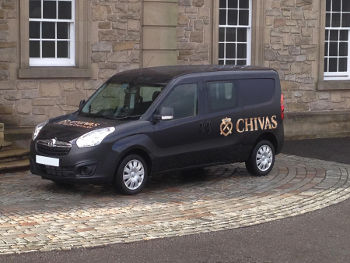
One of Chivas Brothers new Vauxhall Combo Crew Vans for site use, powered by diesel, sadly, not petrol or electric.
Whisky and gin maker Chivas Brothers has opted to renew its existing fleet of Vauxhall Combo site vehicles with new model Combo Crew Vans.
The 15 Vauxhalls will be used by Chivas’ warehousing teams as site vehicles. They will remain on the fleet for the next five years, covering an average of 2,000 miles per year travelling between warehouses to load and unload casks at the beginning and end of the whisky maturation process.
The Combo vans Chivas has purchased are powered by Vauxhall’s standard 1.3 CDTi 16v engine, for which the official specification suggests fuel consumption of 57.6mpg and CO2 emissions of 129g/km.
These models are in ecoFLEX spec and benefit from Start/Stop technology, but while they are likely to be an improvement on the outgoing vans, the idea that these emissions and fuel consumption figures are realistic for low mileage site use is laughable — although I suspect the CO2 figure played a role in the purchase choice. A petrol engine, although more suitable for low mileage use, would, on paper at least, have emitted more CO2.
Still, that’s the inevitable result of the government’s myopic focus on CO2 emissions, to the exclusion of all else: diesels aren’t really that environmentally friendly, especially when they’re cold, and with the vans expected to average just over 5 miles per day, these engines are never likely to warm up fully or deliver the benefits they do offer for high-mileage users.
Not only would faster-warming petrol engines (available in Combos) be more suitable for such low mileage work, they would probably be less troublesome, too — but really, this is a classic example of an application that is perfectly suited to electric vans.
By sticking with Vauxhall, which doesn’t offer any electric vans, Chivas has missed an opportunity. For similar money, after allowing for the government’s plug-in grant, the spirits firm could have purchased Renault Kangoo Z.E. or Nissan e-NV200 electric vans, and reduced on-site emissions to zero.
